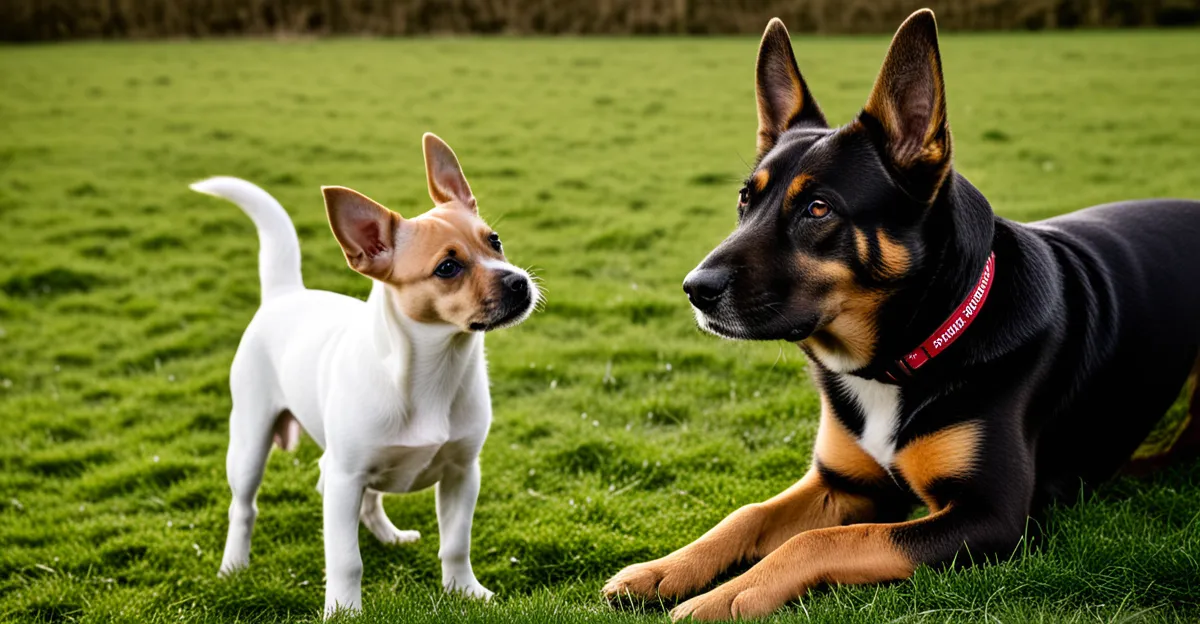Effective Dog Training Techniques in the UK
To have a well-behaved and happy dog, it’s crucial to familiarize yourself with effective dog training techniques, especially in the UK, where dogs are beloved family members. One of the most prevalent and successful approaches in dog training is positive reinforcement. This method involves rewarding your furry friend for good behavior, encouraging them to repeat the action. Techniques such as offering treats, praise, or playtime as rewards are commonly used. This fosters a positive learning environment, reinforcing behaviors in a way that is both encouraging and enjoyable for the dog.
Consistency is key when it comes to dog training techniques. It’s important to be patient and steadfast, repeating commands and setting expectations regularly. Routine helps dogs understand what is expected and reduces confusion. Patience ensures that the learning process remains stress-free and rewarding for both the dog and the owner.
Also to read : Why Should You Consider Exotic Pets as Companions in the UK?
Addressing behavioral issues promptly is imperative for any trainer. Techniques can include redirecting inappropriate conduct to more suitable activities or employing timeouts to discourage unwanted behavior. By focusing on reinforcing positive actions, dogs gradually learn to exhibit desirable behaviors through repetition and reward. These strategies cultivate an obedient, well-adjusted dog that thrives within their environment and helps maintain a harmonious household.
Recommended Training Tools and Equipment
When embarking on dog training, choosing the right tools is crucial. The essentials include collars, leashes, and harnesses. A collar provides identification and a point of control for attaching leashes. Leashes are fundamental for walking, allowing control over your pet’s movements and ensuring safety. Harnesses, often preferred for smaller breeds or those with throat sensitivities, distribute pressure across the chest.
Have you seen this : How do UK climate changes affect pet care routines?
Comparison of Training Aids
Several training aids can enhance your approach, such as clickers and treats. Clickers offer a clear, consistent marker for correct behavior, reinforcing learning quickly. Treats, on the other hand, act as a powerful motivator. Selecting between these largely depends on your dog’s preferences and the specific behavior being targeted.
Selecting the Right Tools
It’s important to choose tools tailored to your dog’s specific needs. Size, breed, and temperament influence the suitability of training gear. Opt for comfortable, adjustable options to ensure safety and effectiveness. Evaluate your dog’s reactions to different aids to refine your approach, ensuring a positive training experience.
Local Resources for Dog Training
In the UK, a rich array of local resources for dog training ensures that every pet owner can find suitable support. Engaging with these resources helps develop effective training techniques tailored to individual needs.
Overview of Notable Dog Training Schools
The UK boasts several established dog training schools known for comprehensive programs. Many of these institutions offer a range of courses from obedience training to advanced behavior training sessions. These schools employ professional trainers who use proven methods such as positive reinforcement, ensuring a well-rounded learning experience for dogs.
Online Resources and Courses
For those preferring the flexibility of learning from home, various online platforms provide dog training education. Websites offer video tutorials, interactive modules, and virtual coaching, covering everything from basic commands to socialization tips. These resources are especially beneficial for owners with busy schedules, allowing for self-paced, detailed learning on effective dog-training techniques.
Community Training Programs
Local communities often set up training programs accessible to pet owners across regions. These initiatives, often hosted in public parks or neighborhood centers, provide an affordable way to engage with others sharing similar goals. Community programs focus on practical training and socialization, fostering a sociable and obedient pup through group activities. The communal aspect offers a supportive environment for both dogs and their owners, facilitating a more enjoyable and effective training process.
By utilizing these diverse local resources, dog owners can enhance their pets’ training, ensuring they thrive both in behavior and social settings.
Best Practices for Obedience and Socialization
Every dog should master a set of key obedience commands to ensure they are well-behaved and responsive. Commands like “sit,” “stay,” “come,” and “heel” form the foundation of effective communication between you and your pet. These commands not only help maintain control but also enhance the dog’s ability to interact calmly in various settings.
An essential aspect of well-rounded training is socializing dogs with both animals and humans. Early exposure to various environments, such as parks, streets, and public spaces, is crucial. This experience helps dogs to adapt and react positively to new situations, reducing anxiety and boosting confidence. It’s important to introduce dogs to a mix of sounds, sights, and experiences gradually, ensuring they develop a stable temperament.
Beyond basic obedience, effective behavior training focuses on consistent positive reinforcement methods. Using treats and praise when a dog correctly follows a command can accelerate learning. This reinforces good behavior and makes the training process enjoyable for your pet. Ultimately, an emphasis on communication through obedience commands and social exposure will lead to a well-mannered and happy dog, thriving in any environment.
Common Challenges in Dog Training
Diving into the world of dog training, it’s essential to recognize and prepare for potential hurdles. Many UK dog owners face behavioral issues such as anxiety, aggression, or excessive barking, which can make training a daunting task. Understanding these challenges is crucial to address them effectively.
Strategies for Overcoming Challenges
To combat prevalent training challenges, consistency and patience are key. Begin by identifying what triggers anxiety or aggression in your dog. Once identified, gradually desensitize and counter-condition their responses to these stimuli. For example, if a dog shows aggression towards other dogs, start by exposing them from a distance, rewarding calm behavior, and slowly decreasing the gap over time.
Provide a structured environment with clear rules to minimize confusion. Positive reinforcement remains a powerful tool, encouraging your dog by acknowledging their good behavior with treats or praise. Keep training sessions short but frequent to maintain your dog’s engagement and prevent frustration.
Resources for Ongoing Support
Enlisting the help of professional dog trainers or behaviorists can be invaluable. Many communities in the UK have local support groups and workshops dedicated to addressing these behavioral issues. Workshops provide an opportunity for dogs to socialize under the guidance of experts. Additionally, joining an online community can offer tips from other dog owners and access to a wealth of experiences and suggestions to navigate similar challenges.
In summary, approach training challenges with a calm and methodical perspective. Utilizing the right strategies and support resources ensures a rewarding training journey, ultimately leading to a happier, well-behaved companion.
Legal Considerations for Dog Owners in the UK
Owning a dog in the UK goes beyond companionship, involving several legal responsibilities to ensure safe and positive experiences for both pets and the community. It’s essential to understand local dog laws and training regulations that dictate how dog training should be managed.
Understanding the Legal Framework
In the UK, several laws regulate pet ownership, focusing on responsible ownership. One key regulation is the Dangerous Dogs Act 1991, which outlines restrictions on specific breeds and mandates proper management to prevent aggressive behavior. Similarly, the Control of Dogs Order 1992 requires all dogs to wear collars with the name and address of the owner.
Responsibilities in Training and Socialization
Dog owners are expected to conduct obedience training and ensure their pets are well-socialized. This responsibility is crucial as it minimizes risks associated with behavioral issues like aggression. Having a foundation in basic commands and social exposure helps dogs adapt to public settings, enhancing community safety and compliance.
Compliance with Local Regulations
To stay compliant, familiarize yourself with local councils’ regulations regarding dog training. Some areas may have specific bylaws, such as leash laws or areas designated for off-leash activities. Staying informed and adhering to these guidelines contributes to responsible ownership and enhances public trust.
Understanding these legal aspects can ensure that training not only benefits the dog but also contributes to the well-being and safety of the wider community.
Links to Reputable Dog Training Organizations
Exploring dog training organizations can provide valuable insights and support to UK pet owners. These institutions, based on their trustworthy resources and affiliations, are instrumental in promoting effective dog training methodologies. Engaging with certified organizations ensures you remain updated on the best practices that align with contemporary research.
National Canine Training Organizations
National organizations such as those certified by prominent canine bodies are pivotal for ensuring professional standards in dog training. They offer a range of resources from training guides to workshops. Being part of these organizations connects you with a network of professional trainers who follow evidence-based training methods.
Local Doggy Daycare Programs with Training
Participating in local doggy daycare programs that incorporate training can significantly enhance your dog’s behavioral development. These programs provide an enriching environment where dogs learn through structured activities. Additionally, the social aspect of daycare helps in reinforcing positive behaviors in communal settings.
Useful Online Communities for Dog Owners
The internet hosts numerous online communities where dog owners can seek advice, share experiences, and find support. These platforms offer forums and social media groups where you can discuss triumphs and challenges in dog training. Engaging with these communities provides access to a diverse array of perspectives and solutions which can be invaluable for any dog owner.







